Children
of a Lesser God
1987
Director: Randa Haines
Starring: William Hurt, Marlee Matlin
Melodrama
usually isn’t my cup of tea. I tend to
go into a film with a very skeptical eye if it at all smacks of a Lifetime
Movie of the Week. From everything I had
heard of Children of a Lesser God, it was an elevated version of said
genre. I wish I could say that my
expectations were proven wrong, but nah, not really.
James
Leeds (Hurt) is a new teacher at school for the deaf. There he meets Sarah (Matlin), a former
student of the school who is now a janitor.
She is tremendously angry and refuses to learn to read lips or try to
talk. He is fascinated and pursues
her. They begin a turbulent love affair
that, both literally and symbolically, focuses on the issue of communication.
What
I liked, and what I thought Children of a Lesser God did pretty
well, was the portrayal of the prickly nature of relationships. Relationships aren’t easy sometimes, and
James and Sarah certainly know about that.
Theirs is a relationship typified by passion of both the angry and
romantic nature. James likes Sarah, but
he keeps trying to change her. She is
bound and determined to stick to sign language, and does not want to learn to
read lips or speak, but James, as someone who teaches deaf and hard of hearing
students to read lips and speak, can’t really understand this. He tells her several times that he’s sorry,
and he won’t try to change her, but then he just plain does it anyway. It’s like he can’t help himself. In the “Big Fight Scene” (oh come on, this is
a romance, you must have figured out there would be a “Big Fight Scene”), Sarah
accuses James of not allowing her to be an individual. She realizes that she has lost herself in the
relationship. Thank goodness for that
scene, because up until that point, that was exactly what I was thinking. Why on earth was James continually trying to
take charge and lead Sarah around? He
was making all these decisions for her rather than asking her. He was making changes that affected her life
FOR her. Thank goodness Sarah realized
it, because if she hadn’t, I would be writing a very different review right now,
one that would involve every synonym I could think of for “ridiculous.” She pulls away from him, from their
relationship, because she is such a strong character, she won’t allow that to
happen to herself. I liked that, and
Matlin does a great job with her performance.
Ultimately,
their romance concludes on an ambiguous note.
It’s uncertain as to whether Sarah has it in her to stand up to James
for good or whether she will slide back into old habits. Now normally, I like ambiguity, but here, the
ending feels unfinished, and that, I’m not as keen on. It is unclear as to what path Sarah will
follow. Will she continue to allow James
to choose her life for her? Has he
realized what a control-monger he was being?
Will they really reach the idealized compromise he speaks of
condescendingly in his final speech?
Unknown. Perhaps it’s better that
way. Films need more ambiguity after all. I guess from my decidedly feminist and
optimistic perspective, I’d love to think that James has been cowed and humbled
by Sarah’s dizzying display of strength and is now going to spend the rest of
his days playing lapdog to her powerful persona. Probably not true, but I’ll just happily
think that to myself.
Although
I dislike the general idea of a woman losing herself in her relationship, I
will say that William Hurt does a fantastic job of playing a man very much in
love. He is not willfully trying to sap
Sarah of her independence; he is driven by his powerful love for her. Matlin is very good as Sarah (she won the
Academy Award for her performance), and it is easy to see why James became
entranced with her. Plus I admit to
having a bit of a crush on 1980’s William Hurt.
He has several scenes where he walks around without a shirt on, which I
don’t mind at all. Nope, not at all.
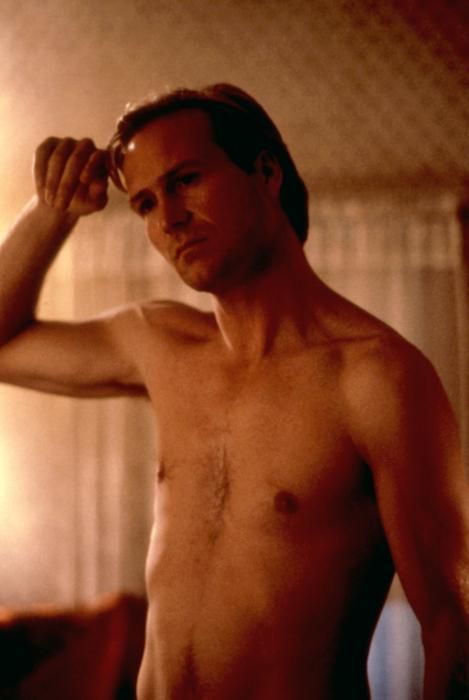 |
| Yup. Right there. There's the stuff. |
James
Leeds is a teacher. I am a teacher. I am a teacher 100% by choice, it having been
a very conscious and deliberate career change for me. I love my job with a passion. And I hate stereotypical movie portrayals of
teachers. Which, unfortunately, is
exactly what we have in Children of a Lesser God. The plot opens with James being told by the
nondescript stuffy headmaster of the school that he shouldn’t dare to try any
whackadoodle newfangled teaching techniques here; we like our education
traditional! *roll of the eyes number
one for me* Then we cut to James’ first
class, first day, where he does a whackadoodle handstand to get his students’
attention. *more eyerolling* Not long
afterwards, James plays music very very loudly in a one-on-one lesson with a
student. Angry stuffy headmaster comes
in and huffily turns the music off. *by
now my eyes seem to be permanently looking upward, they’ve been rolling so
much*
Blessedly,
it stops there. Which is weird. The film opens with every sort of implication
that this is going to be yet another “young upstart teacher bucks system,
inspires students, pisses off administration” movie. And then it’s not. As soon as James meets Sarah, the film most
definitely focuses on their relationship and rather forgets the teacher angle. We cut back every now and then to a shot of
James working, but it’s no longer about that.
To be clear, thank goodness the film doesn’t develop along those lines,
but it makes the opening of the film disjointed from the rest of it. Realistically, it doesn’t matter a lick that
James works at a school, because the film is about his relationship. So why bother setting up the tension between
James and the headmaster if it ends up going absolutely nowhere? I don’t get it.
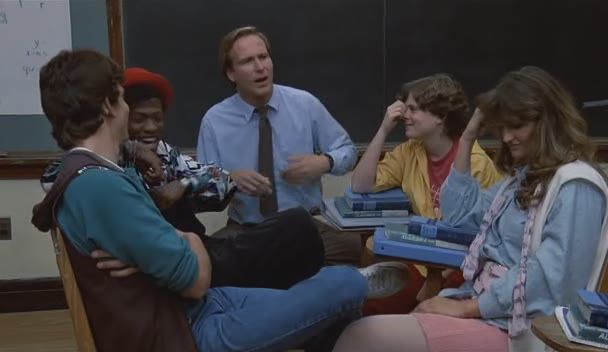 |
| Look, he's such a rebel teacher, he has his students sit in a SEMICIRCLE!!!!!! |
Ultimately,
I like that the relationship between James and Sarah seemed real. There were high points and low points to
their relationship, but none of them seemed nearly as contrived as other movie
romances. Their problems were real
problems, not movieland problems. This
was the strongest part of the film. The
rest of the film – the school, the teacher aspect, the students, the tacked-on
bit with Sarah’s mother that feels uncomfortably out of place – is not nearly
as strong as that. I would almost
recommend skipping the first few chapters on the DVD and just get to the place
where James meets Sarah. Fast forward
through any scene that doesn’t involve them.
You’re not missing much.
Arbitrary
Rating: 6.5/10 for inconsistency. It's better than a Lifetime Movie of the Week for sure, but it never wholly clicked for me. Some
parts were better than this score, others were worse.
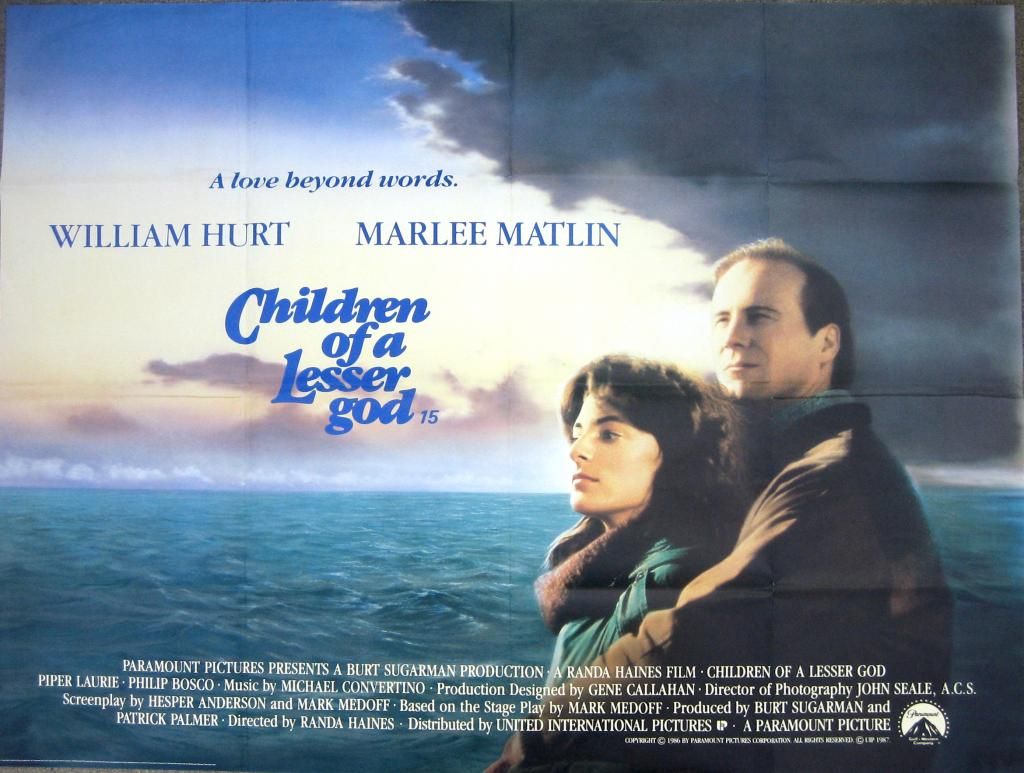
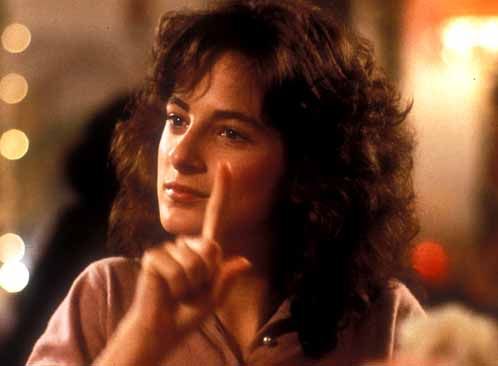
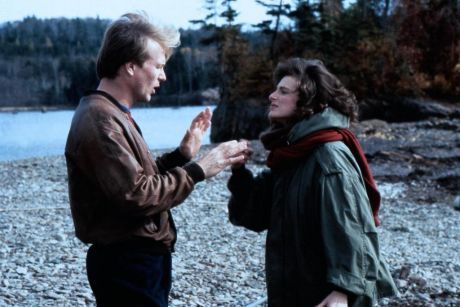
I'm not that sure it's better than a movie of the week. It still pisses me off that Marlee Matlin won an Oscar as an angry deaf woman portraying an angry deaf woman and Sigourney Weaver's portrayal of Ripley in Aliens lost.
ReplyDeleteIn his review of this Squish makes the point that instead of subtitling her speech, we're told what she's signing by him. It's a way of marginalizing her to the audience--she can't communicate with us but through him. It's a damn fine point and I wish I'd thought of it when I watched this.
I read that in Squish's review as well, and just like you, I was pulling a massive facepalm, wishing I had thought of it too. It's a great, and extraordinarily relevant point.
DeleteSee, I've only seen Aliens once and it was about 15 years ago. I therefore have no opinions on it until I watch it again, but I do think Sigourney Weaver is, in general, quite awesome.
It's been almost 25 years since I saw this film. (Obviously I never felt a desire to see it a second time, but I don't remember disliking it.) From what I remember of my impressions I saw the ending as a copout either because the filmmakers couldn't figure out how they should end it, or because the filmmakers were trying to be all things to all people and didn't want to make anybody angry.
ReplyDeleteI don't have a problem with Matlin winning the Oscar, although I heard a rumor that Hurt did. They had a thing going on in real life, and it was a nice moment at the Oscars when Hurt (who had won Best Actor the year before) got to announce her name as the winner that year. His expression was quite something. They broke up sometime after, though, and I heard one reason might have been that he was jealous of her winning for her first film when he "paid his dues" in several good roles before finally winning. That might have just been all hearsay, though.
By the way, other than the fact that she was deaf, Matlin had nothing else in common with the character she played, so she actually did act in the film, not just play herself. It's no different than Hurt playing a character who happens to have the same voice that he does in real life.
As for Sigourney Weaver in Aliens, I've enjoyed the film several times now, but the Academy just doesn't give Oscars for people from action films, especially not science fiction ones. (She might be the only woman even *nominated* for a sci-fi action movie role.) The closest to action movie winners I can even think of are Hilary Swank for Million Dollar Baby and Robert Deniro for Raging Bull - both movies are about boxers, but neither really focused on the action. Even if Matlin hadn't won, Weaver still would have probably lost to one of the other nominees (Jane Fonda, Sissy Spacek, and Kathleen Turner - not exactly chump change).
As for science fiction, I doubt even Heath Ledger would have won Best Supporting Actor for The Dark Knight if he had not passed away beforehand. Being nominated is pretty much a win for anyone from one of these kinds of films, and even that is a rare occurrence. Hell, even the Lord of the Rings trilogy, with 30 nominations and 17 wins was only given a single acting nomination across all four categories and all three films combined (Ian McKellen for Supporting Actor for the first one.) The Academy just marginalizes these genres - another reason why they've been resisting adding a category for best stunt work for the last three decades.
And sorry for making you read so much. This was a long comment, even for me. Maybe I should have directed that energy to writing my next posts. I haven't written one for several days now.
DeleteHey, no worries. The Academy certainly does love its dramas. I mean honestly, if a movie is any other genre, it's an uphill battle to get any sort of Oscar recognition. Not just action and sci-fi/fantasy, although these are certainly genres that feel the brunt of Academy oversight, but comedies as well. I think this focus on drama is that it "looks" hard; you can "see" the effort. Other genres, because they're more entertaining, have to mask all the terrifically hard work put into them in order to make sure they entertain.
Deletecheap uggs
ReplyDeleteoakley outlet online
michael kors handbags
longchamp outlet
kobe basketball shoes
skechers shoes for men
yeezy sneakers
ugg boots uk
cheap oakley sunglasses
jordan shoes